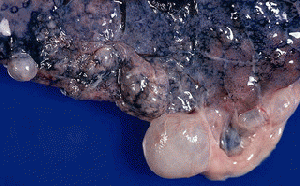Both asthma and chronic obstructive pulmonary disease (COPD) are chronic diseases involving airflow obstruction and are consequences of gene environment interaction. COPD includes progressive respiratory diseases like emphysema and chronic bronchitis and is characterized by decreased airflow over time and increased inflammation. While airway obstruction in asthma is reversible, airflow limitation in COPD is usually not reversible, although one third of COPD patients do respond to bronchodilators agents and show good reversibility.
Long standing asthma that has become unresponsive to treatment can lead to chronic irreversible airflow obstruction with reduced lung function resulting in COPD.
The delicate nuances between these two seemingly similar diseases were brought out through interesting panel discussions at the recently concluded 20th NESCON (20th National Conference on Environmental Sciences and Pulmonary Diseases), organized by the Academy of Respiratory Medicine in Mumbai under the auspices of Environmental Medical Association.
Dr Raj Kumar, Professor and Head, Department of Respiratory Allergy and Applied Immunology and National Centre of Respiratory Allergy, Asthma and Immunology (NCRAAI), at Vallabhbhai Patel Chest Institute (VPCI), advocated the use of allergen specific immunotherapy for treating allergic bronchial asthma. Specific immunotherapy has long term preventive effects on seasonal and perennial asthma and can benefit selected asthma patients by reducing symptoms, reducing requirement of medication, improving quality of life and has long term benefits. According to a Cochrane meta-analysis immunotherapy can reduce asthma symptoms, need for medications, and risk of severe asthma attacks after future exposure to the allergen.
Dr Kumar said to Citizen News Service (CNS): "We need to identify the clinically relevant antigens and then treat the patient with them. The mechanism is to produce blocking antibodies IgG to reduce production of IgE antibodies which are responsible for type 1 hypersensitive reaction. After initiation of immunotherapy there is an initial rise in IgE levels and then gradual but consistent fall. However, this therapy carries the risk of anaphylactic reactions and should be prescribed only by physicians who are adequately trained for treating allergies."
A breathing test called spirometry is carried out to assess the severity of airways obstruction. The spirometer takes two measurements: the volume of air breathed out in one second (called the forced expiratory volume in one second or FEV1) and the total amount of air breathed out (called the forced vital capacity or FVC).
FEV1 value is more than 80% or more of the predicted value indicates mild asthma, and COPD is diagnosed if post-bronchodilator FEV1/ FVC value is less than 0.7. FEV1 more than 50% indicates severe COPD.
COPD is not limited to lungs but extra pulmonary effects on muscles and metabolism are also severe. Although non- smoker COPD is also possible, COPD is almost always associated with a long history of smoking and/or exposure to biomass fuel smoke in poorly ventilated kitchens; while asthma occurs in non-smokers as well as smokers although smoking can worsen asthma. Approximately 10% of patients of COPD may have features of asthma also.
Dr Suhas Bardapurkar, senior consultant respiratory physician in Aurangabad, Maharashtra, lamented that most of his COPD patients are not able to even pronounce that word correctly let alone understand the implications of the disease. Calling COPD 'beedi ki peeda' (the pain of smoking), he said that although it is more serious than asthma, it is often misunderstood as asthma.
COPD is preventable, while asthma is not. Yet COPD is an under diagnosed, under treated and a neglected respiratory disease and its burden is substantially under estimated since non-respiratory diseases account for more than 50% of underlying causes of death in COPD.
In the opinion of Dr. Bardapurkar, "Spirometry is the best test for diagnosing and monitoring treatment outcomes of COPD. Without spirometry we cannot diagnose COPD, yet it is not very popular with doctors due to their lack of understanding and knowledge about it. Of course, the technician performing the test should be well trained so that he/she can demonstrate to the patient how to breathe in and hold air and exhale to check for COPD."
(Note: You can view every article as one long page if you sign up as an Advocate Member, or higher).






